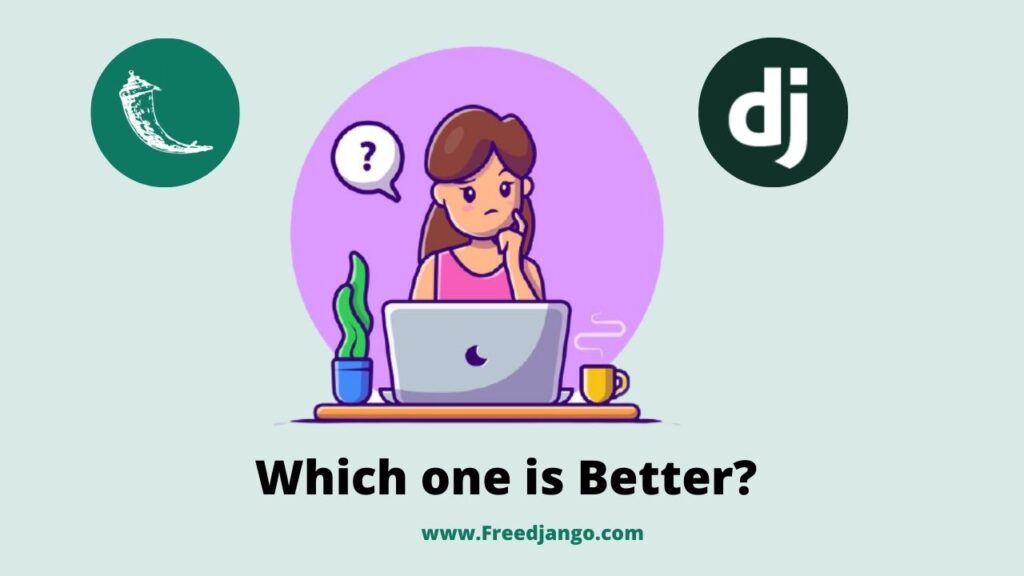Flask vs Django: Django provides its own Django ORM and uses data models, while Flask doesn’t have any data models at all.
Which is better: a spoon or a fork? Headphones or speakers? Slippers or boots?
This sounds about as crazy as the question about Flask and Django.
Instead, it’s better to ask, “How is Flask different from Django?” and “When should I use Flask and when should I use Django?”
We need to figure Flask vs Django out. Let’s get started!
What are Django And Flask?
Frameworks make life easier for programmers by providing a ready-made framework for developing a web application.
In addition, they automate the execution of routine, often repetitive tasks.
This saves developers time by allowing them to focus on the application logic.
Here we have two Python frameworks, Django and Flask.
Let’s have a closer look at each of them:
Django
We all hear crazy stories about some of the largest websites on earth using Django.
There are good reasons for that since Django is not only readable but also quite user-friendly.
Django’s strengths lie in the goal it sets for itself.

Django is great for building a complete Python web application.
It has everything out of the box for fast and efficient development.
Immediately after installation, you will have access to your own template engine, ORM for working with the database, migration mechanism, means of authentication, storage, and encryption of passwords, your own admin panel, email newsletters, tools for working with forms, etc.
All these components interact perfectly among themselves and allow you to create your own projects in the shortest possible time.
Django not only simplifies project administration but also makes it much easier to get started.
Many of the things your application will need are built into your Django project launch command.
Get: Free Django Hosting
Flask
Flask is a micro-framework with just two components Werkzeug and Jinja 2.
Werkzeug is a simple router that processes requests and routes responses. It also provides WSGI compatibility for using the framework with a web server.

Jinja 2 is a templating engine that inserts server-generated data into a layout HTML page.
Flask is definitely a very popular choice for both Data Nuts and Data Scientists.
Flask is the lighter of the two!
Flask often takes a “build from scratch” approach for most of your website.
Flask is lightweight. This makes Flask a great choice for endpoints, requests, and pipelining.
Flask does not have a layer for working with databases or other functionality provided by other frameworks.
In fact, Flask is just a request router, everything else that may be required in development must either be written by yourself, or you must connect the necessary modules.
Don’t be fooled into thinking that this framework is only suitable for small projects!
Flask makes dumping HTTP requests extremely easy by effectively creating endpoints for the entire duration of use.
Main Difference Between Flask vs Django?
Both Django and Flask are Python web frameworks!
Django, on the one hand, provides a fully functional Model-View-Controller framework.
On the contrary, Flask is a micro-framework that offers a basic authorization toolkit or a third party plugin like Flask HTTP-Auth.
Below are lists of points, describe comparisons between Django vs Flask, that will help you to closely differentiate between them.
| Basic comparison between Django and Flask | Django | Flask |
|---|---|---|
| Structure | Django is a free open-source Python-based framework that follows the MVC (Model View Controller) approach to architectural patterns. | Flask is a Python-based micro-framework without any set of special tools or external libraries. It also has no database level or form validation conditions and uses extensions. |
| Specifications | Components: 1. Object-relational cartographer 2. Model-relational database 3. Web template engine 4. Regular Expression URL Dispatcher 5.Serialization 6. Inheritance 7. Caching 8. Support for middleware classes 9. Internationalization 10. Unit testing module Related Applications 1. Authentication system 2. Admin interface 3. Atom and RSS syndication feeds 3. Google sitemaps 4. Built-in mitigation 5. A framework for GIS applications 6. Extensibility 7. Server location | Development serverDevelopment debuggerBuilt-in unit testing supportJinja2 templatesSupport for secure cookiesFully WSGI compliantExtensive documentationUnicode basedGoogle Application Engine CompatibilityExtensions for desired functionsModular and lightweight designORM agnosticHigh flexibilityProviding an HTTP requestAPIs are nicely shaped and consistentEasy to deploy in production |
| Websites using this framework | Public Service Broadcasting Service, Mozilla, Instagram, The Washington Times, BitBucket, Disqus, Nextdoor. | Pinterest, LinkedIn, and Flask |
| Project plan | Common project structure | Arbitrary structure |
| flexibility | Doesn’t rule out customization flexibility | All possible permutations for organizing the Flask code are considered to be equal to the number of applications already in the flask. |
| Routing mechanism | Urls.py is used to set connection properties, and requests are processed by the first matching regex list representation. | The URI is most often not set by the view decorator, and centralized configuration is possible. Before patterns are matched against a URI, the latter is sorted in the default order |
Django Advantages
Django has the following noteworthy advantages:
Django Key Features
Django has some eye-catching features. I have listed a few of them for you:

1- The Django framework is time-tested
Django is often among the very first frameworks to respond to the discovery of a new vulnerability.
Although no one will claim that all bugs have been fixed in this framework, the team has nevertheless dealt with many of them.
Many Django releases today are focused on both new functionality and solving edge case problems.
2- Access to a large number of packages
The Django community, like the Python community, creates many useful packages and utilities that anyone can use.
Type “Django” on PyPI and you’ll see over 4,000 packages available, and Django already has a battery-in-a-box mentality.
This framework will likely have everything you might need.
3- This framework is constantly being crowd-tested.
Django is behind many very popular sites like Instagram and Pinterest.
Even Facebook uses this framework for many behind the scenes operations.
Django was originally designed to work with news publications, so it’s no surprise that it is the best!
4- Django has excellent documentation
Over time Django’s documentation has gotten even better.
When it first went public, the documentation was one of the highlights of Django, something that made it stand out from the crowd.
Most of the frameworks at that time only had an alphabetical index of modules, methods, and attributes.
Such documentation is good to use as a reference. Django’s documentation is no longer unique in terms of quality, but it can still serve as one of the best examples of documenting open-source projects.
The developers are constantly taking care of its support.
Get: Free Django Hosting with custom Domain
5- The Django community is there to support you
The community is often said to be one of the best aspects of the Python world.
The same, even superlatively, applies to the world of Django.
This framework is operated by the Django Software Foundation (DSF).
Every Django event is subject to a specific code of behavior.
DSF has issued statements on diversity (diversion), thus indicating the official position of the community it represents.
Of course, rotten apples are found, but they are quickly dealt with.
6- Django defends many SEO-focused rules
Web developers and SEOs don’t always get along.
The developer’s job and the optimization of a product for search engines often collide.
Django reduces the severity of this problem. Even without mentioning anything else, the Django framework promotes the use of URLs that are easy for humans to read.
All in all, your SEO team will surely appreciate this.
7- Scalability
Django is, of course, great for getting started with development.
Django offers a collection of ready-to-use components.
Since these components are decoupled, that is, independent of each other, they can be disconnected and replaced with others when your startup requires more specific solutions.
8-Safety
Django prevents many common security errors by default and does better than, say, PHP.
For example, Django masks or hides your site’s source code, preventing it from being viewed directly on the Internet.
It does this by dynamically generating web pages and using templates to send information to browsers.
Which projects are Built with Django Framework?
Django has been used to build a variety of projects some of them are:
Flask Advantages
Falsk has the following advantages:

Flask Key Features
Flask is a Micro-framework offering a variety of features. They are:
1. Lightweight
Flask is a lightweight and easy to use framework that does not require any special knowledge.
This means if you are a beginner then you can trust this framework blindly!
2. Concise
Flask is not as complex as Django. It is easy to use. Getting started is simple, even without much web development experience, you can quickly make a website.
It is great for small websites!
It is very suitable for developing web services API. All aspects of performance are equal to or better than Django
3. Extensibility (I think the most important feature)
Flask is free, flexible, and extensible. It has a wide selection of third-party libraries. You can combine your favorite wheels during development and also combine the most popular and powerful Python libraries.
Flask develops flexibly. Python masters will basically like Flask, but they may have mixed praise and criticism for Django.
4. Core (Werkzeug and jinja2) Jinja2 refers to the template engine
Flask started out as a simple wrapper for Werkzeug and Jinja. Now, it has become one of the most popular Python web application frameworks.
The use of Flask with NoSQL databases is far superior to Django.
What types of Projects can Be Built using Flask FrameWork?
There is not one ,not two but a plethora of projects built using Flask. Some of them are listed below:
Which Framework is to choose?
Choose the one that best suits the needs of the project. Here are my recommendations:

Choose Flask if …
Choose Django if …
FAQ’s
Which is better, flask or Django?
It totally depends on the need of the project. Both are great platforms to build a new project.
If you want to have an eye on each and every aspect of your project, then go for Django.
On the other hand, if your project is small and there are not many heavy requirements then Flask is perfect!
Are Flask and Django the same?
No, they are not the same.
Django is a bit heavy framework with greater complexity while Flask is a simple yet lightweight framework.
Should I learn Flask before Django?
Well, if you are a beginner then, I will suggest you start with a Micro Framework like Flask.
You can then upgrade to Django, which itself is a complete package.
Is Django harder than Flask?
Both are used for the development of new projects in Python. Django is a bit elaborated framework, while Flask is more flexible in terms of use.
Conclusion
This is all about Flask vs Django.
All in all, Django and Flask, both are open source Python web frameworks.
Django is a full-stack framework, while Flask is a micro and lightweight framework.
There is no strict set of rules about what to use!
Know your requirements and choose the framework wisely according to the needs of your team.
I hope this Flask Vs Django post would have helped you!



